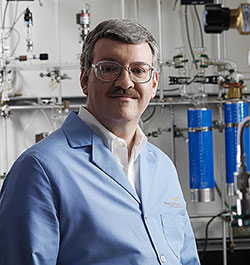Kicking the Precious Metal Habit
by R. Morris Bullock

Morris Bullock
Our craving for more and more energy is causing an overdose on precious metals, and like most overdoses, the results could be catastrophic. We must develop carbon-neutral sources of energy to respond to a growing worldwide demand for energy and an urgent need to reduce emissions of carbon dioxide from fossil fuels. Unfortunately, current methods for developing these new energy sources require precious metals that are used as catalysts for energy conversion reactions.
Precious metals are remarkably effective at catalyzing chemical reactions and work well in laboratories. But what if we want to scale the use of the metals up to real-world applications – such as storing electricity generated by wind turbines into chemical bonds in hydrogen and then getting that energy back on demand? Scarcity and cost make these materials a precarious choice, especially given the economic and sustainability issues we face in today's world.
So, what will it take to kick the precious metal habit?
We need to replace precious metal catalysts with cheaper, earth-abundant alternatives. These alternatives include iron, nickel, and other metals that are more than 1000 times less expensive than platinum or other precious metals. But the problem is not a one-to-one replacement. We need entirely new catalysts.
The team at the Center for Molecular Electrocatalysis is doing just that. In the past several years, they have created hydrogen-splitting and hydrogen-producing catalysts that use iron or nickel instead of a more expensive metal. They have designed these chemical catalysts by copying the guiding principles that nature has already worked out in a naturally occurring protein that performs the same function.
They are following up iron and nickel with manganese and other metals. We want to coerce these cheap metals into doing what the precious metals do. This won't be easy, but staying hooked on precious metals will be less tolerable in an era where sustainability and security concerns begin to outweigh the fact that precious metal catalysts work so well. It will take basic research, new technologies, and a long-term commitment to move from the expensive catalysts of today to solutions that are inexpensive, efficient and environmentally sustainable.
Bio: Dr. R. Morris Bullock is Director of the Center for Molecular Electrocatalysis, an Energy Frontier Research Center funded by the Department of Energy's Office of Science and based at Pacific Northwest National Laboratory in Richland, Wash. He is the editor of Catalysis Without Precious Metals, a book published in November 2010 by Wiley-VCH.

